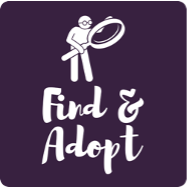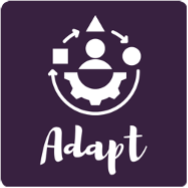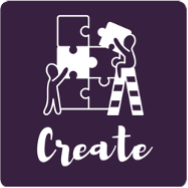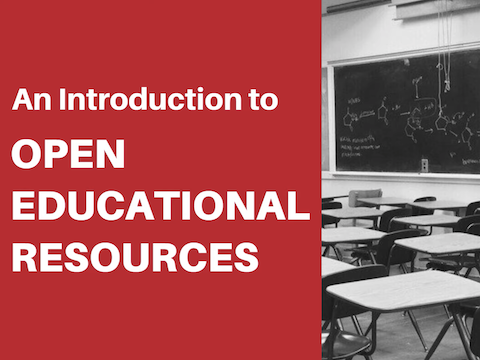Open Educational Resources at WCU
Overview
This page will provide you with general information about Open Educational Resources (OER) and what WCU is doing to promote the use of them. Additionally, you will find links to University Libraries resources, TLC programs, and an OER repositories subject guide.
What Are OER?
Open Educational Resources (OER) are educational materials for teaching, learning, and research that are either openly licensed or in the public domain, allowing for their free use and adaptation by others.
There is a wide range of OER material types available, some include textbooks, lecture notes, full courses, instructional videos, images/graphics, software/applications, and learning activities.
Why Are OER Important to WCU
At West Chester University, Open Educational Resources (OER) play a pivotal role in promoting equity and access by eliminating financial barriers to education. By providing free, customizable learning materials, OER empower educators to tailor content to diverse student needs, fostering an inclusive learning environment where all learners can thrive. OER is just one-way WCU is addressing text affordability for its students.
Faculty across campus have been adopting OER in their course for years to combat rising textbook cost. Additionally, the University Libraries has provided faculty with OER resources on how to find, adopt, and adapt them. The Teaching and Learning Center has focused on providing faculty trainings and support in order to create free eTextbooks for students through the WCU eTextbook Initiative since 2017, and to create OER with three other PASSHE institutions through our grant funded project: The Pennsylvania Alliance for Design of Open Textbooks (PA-ADOPT) since the Fall of 2021.
Fall 2024 Faculty OER Awareness Survey Results
To better understand faculty engagement with Open Educational Resources, WCU conducted an OER survey in Fall 2024. The survey gathered valuable insights on OER awareness, adoption, and future aspirations. The results and key highlights are available online, offering faculty a detailed overview of OER usage across campus.
View the survey highlights: 2024 WCU Faculty OER Awareness Survey Highlights
The Impact
As of the Fall 2024 semester, the eTextbook Initiative books have been used by 4,573 WCU students in 211 course sections, eliminating $225,727 in student costs.

PA-ADOPT is taking its efforts a step further by evaluating the impact of its eTextbooks on student outcomes. Beyond simply reducing costs, the adoption of PA-ADOPT eTextbooks is driving measurable improvements in academic performance across the four participating institutions. We tracked key performance indicators from Fall 2023 through Spring 2024 to gain an understanding of how these resources contribute to student success.

Average course grade increased 2.88%

Average failure rate deceased 0.47%

Average withdrawal rate decreased 2.36%
As of October 2024, 36 WCU faculty have either authored, co-authored, or are in the process of authoring at least one book as part of our two initiatives. Here are just a few examples of what they have accomplished:
Afrand Agah, Ph.D.
Professor, Computer Science
As a member of the 2023-2024 cohort of the eTextbook Initiative, Afrand wrote Python Programming Made Simple for CSC 141, eliminating a textbook that previously cost students $95. As of Fall 2024, her book saved her students $8,645, and has published a second part of the book for PA-ADOPT for CSC 495 that focuses on data science: Introduction to Data Science Using Python.
Jaeyong Choi, Ph.D.
Assistant Professor, Criminal Justice
Jaeyong first joined the eTextbook Initiative as a member of the 2021-2022 cohort and wrote Theories of Crime and Delinquency for CRJ 210, replacing a textbook that previously cost students $75. He then rejoined the initiative the following year and wrote Interdisciplinary Perspectives on Terrorism for CRJ 316, replacing another textbook that previously cost students $125. As of the Fall 2024 semester, his books have been used by almost 430 WCU students, collectively saving them $38,600. He has now published his third book Basic Statistics Using R for Crime Analysis, for PA-ADOPT, replacing course materials previously costing students $106.
Jordan Schugar, Ph.D.
Professor, English
Jordan was part of the eTextbook Initiative’s 2018-2019 cohort and wrote Somewhat Practical Applications for Digital Storytelling, which has since been used by over 700 WCU students in a variety of Digital Humanities & New Media, Literature, and Writing courses. As part of PA-ADOPT, he has teamed up with Chris Penny (Professor, Educational Foundations & Policy Studies) to expand his digital storytelling book: The Digital Storytelling Handbook, serve as a member of the grant’s internal advisory group, and has been a part of the grant’s training team discussing his own research in eBooks and demonstrating page layout and design techniques.
What Next?
OER can be used in many ways and take on various shapes as mentioned. The resources below can guide you in choosing the approach you wish to take to explore OER further in your courses, whether you seek to identify and implement a preexisting OER, wish to alter an OER to fit your needs, or hope to create your own from scratch. Select from the accordion below to explore the various avenues you can take and read a little bit about the benefits on OER use beneath.
Find and Adopt through the University Libraries OER Resources

WCU University Libraries has an OER guide breaking down the process of sourcing an OER that fits your needs and access to additional resources on how to adopt it into your course: Finding and Adopting OER.
Explore some OER Subject Guides to identify available resources you could use in your courses. 23 subjects are listed on the page, along with an “Other” category. The subject guides are taken from MERLOT: Multimedia Educational Resource for Learning and Online Teaching from California State University Long Beach, the OER Commons from Institute for the Study of Knowledge Management in Education (ISKME), and The Open Textbook Library based in the Center for Open Education in the University of Minnesota’s College of Education and Human Development.
Adapt OER with the TLC

If you do not know where to start in creating an OER or do not have the time right now, adapting a preexisting OER/eTextbook to suit your needs can be a great place to start. The Teaching and Learning Center and the University Libraries hope to develop further programing in order to support OER adaptation more wholistically in the future. Additionally, you can follow the Open Education Networks’ Guide Modifying an Open Textbook: What You Need to Know (CC BY) that focuses on the following five steps:
- Check License
- Identify Format
- Assess Edit-ability
- Determine Access
- Publish Textbook
When adapting an OER, it's important to consider the 5Rs, which enable you to participate in the following actions:
- Retain: the right to make, own, and control copies of the content
- Reuse: the right to use the content in a wide range of ways
- Revise: the right to adapt, adjust, modify, or alter the content itself
- Remix: the right to combine the original or revised content with other open content to create something new
- Redistribute: the right to share copies of the original content, revisions, and remixes with others.
Create OER and eTextbooks with the TLC

The TLC initially embarked on eTextbook creation with faculty through the eTextbook Initiative, conducted annually with cohorts typically consisting of around five participants. This initiative evolved into PA-ADOPT, which consisted of three separate cohorts involving approximately ten faculty members from four institutions. Both programs focused on training faculty in the development of their own eTextbooks using Apple Pages. Each faculty author cohort participates in a seven-stage process:

- Getting Started: project goals and requirements, resources, overview of eBooks and eBook components.
- Planning and Preparation: audio and video production, using third-party content legally and other legal issues, *Open Educational Resources workshop, inclusive design*, and accessibility.
- Writing Break: training pauses to allow authors time to write their initial chapter(s) and focus on completing two practice books.
- Apple Pages: page layout and design, visual effects in Pages, book navigation, common construction issues and incompatibilities, generating the eBook files, submitting a completed chapter for technical review.
- *Copy Editing/Peer Review: remaining text is copy edited, then peer reviewed using an open peer review process*.
- Construction and Technical Review: construction of the book is completed and reviewed for layout, technical, and accessibility issues.
- Final Submission: final technical check is completed, and the book is made available online for general use on the bookshelf.
*Indicates PA-ADOPT specific steps of the process*
While there are presently no available positions for faculty in eTextbook and OER creation, the TLC is actively exploring new avenues to facilitate ongoing faculty engagement in OER creation. To learn more about the eTextbook Initiative read about it on the Faculty Support page, but if you want to get thinking and explore what faculty have done in the past you can browse the eTextbook Initiative Bookshelf and the PA-ADOPT Bookshelf.
Why Use OER?
There are many benefits in choosing to adopt, adapt, or create no-cost OER rather than using higher-cost textbooks or learning materials:
- Accessibility: OER can be accessed by anyone with an internet connection, ensuring more equitable access to learning materials.
- Adaptability/Customization: OER can be modified and tailored to meet the specific needs of diverse learners, enhancing flexibility and relevance.
- Collaboration: OER promotes collaboration among educations and institutions by freely sharing and adapting resources through various organizations, such as The Creative Commons Global Network.
- Cost Savings: OER are typically free or significantly cheaper than traditional textbooks, reducing financial burdens on students.
- Innovation: OER encourages educators to experiment with new teaching methods and technologies, fostering innovation in teaching and learning.
Interested in Learning More?
Interested in shaping the future of education at WCU? Learn about existing programs like the eTextbook Initiative and PA-ADOPT and discover how you can contribute to expanding access to affordable, high-quality educational materials. Reach out to Marc Drumm so you can learn more and start your next OER conversation.
References
Creative Commons. (n.d.). Open Education. Creative Commons. Retrieved March 11, 2024, from https://creativecommons.org/about/education-oer/.
Creative Commons Network. (n.d.). About. CC Global Network. Retrieved March 11, 2024, from https://network.creativecommons.org/about/.
Hilton, J. (2016). Open educational resources and college textbook choices: A review of research on efficacy and perceptions. Educational Technology Research and Development, 64(4), 573–590. https://doi.org/10.1007/s11423-016-9434-9.
Penn State. (n.d.). Benefits of Using OER. PennState OER and Low-Cost Materials at Penn State. Retrieved March 11, 2024, from https://oer.psu.edu/benefits-of-using-oer/.


